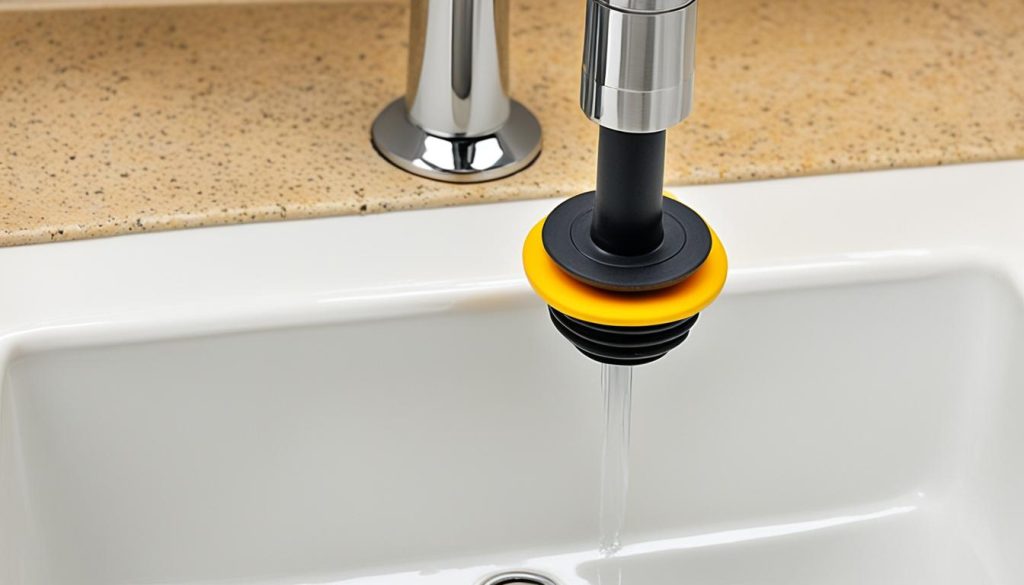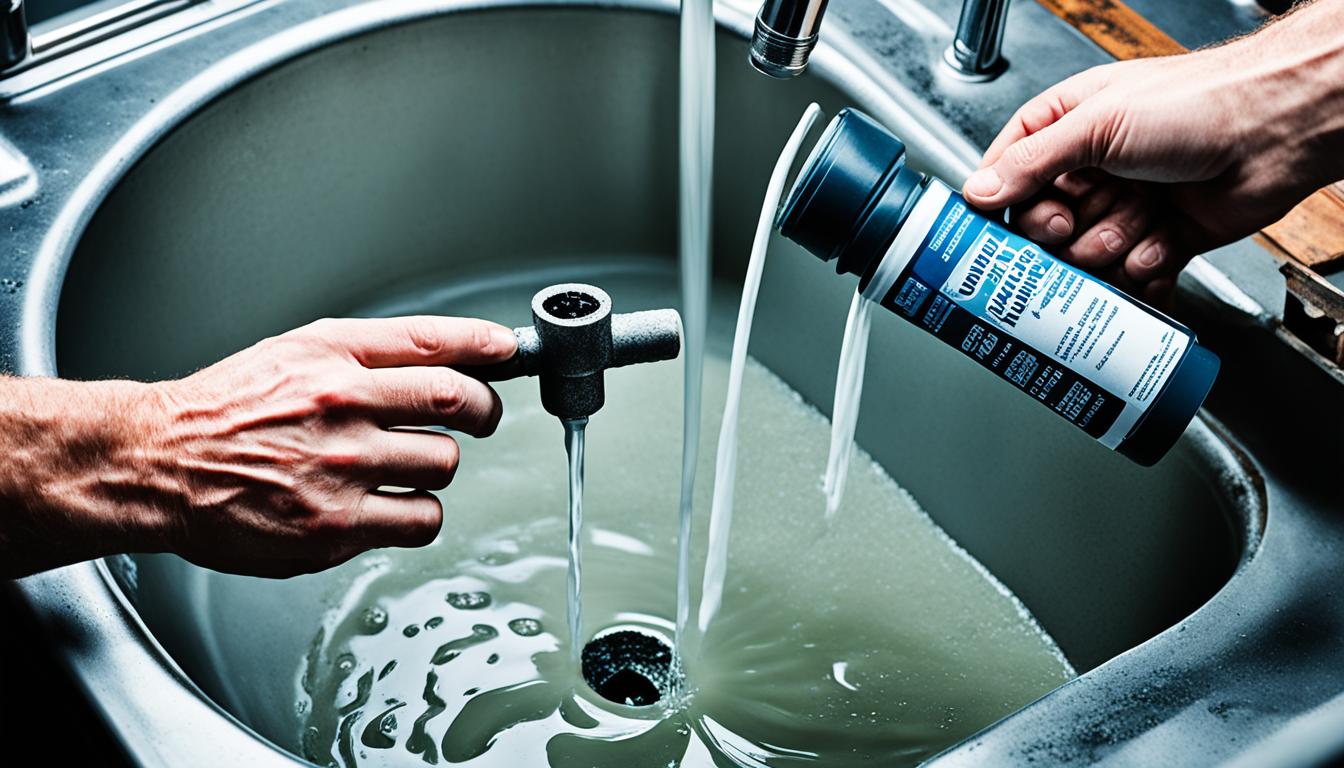Welcome to our guide on how to unblock a sink. Dealing with a blocked sink can be a frustrating experience, but don’t worry – we’re here to help! In this article, we will provide you with easy steps to unblock your sink and get your drainage back to normal. Whether you’re facing a sluggish kitchen sink or a stubborn bathroom basin, our sink unblocking tips and solutions will have your sink flowing freely in no time. Let’s dive in and get your sink back to its best!
How to Unblock a Sink Without a Plunger?
If you don’t have a plunger, there are other methods you can try to unblock a sink. One option is to use bicarbonate of soda and vinegar. Start by pouring boiling water down the drain, then add baking soda and vinegar to create a chemical reaction. Wait for the mixture to work and flush with boiling water. You can also try using soda crystals or washing powder to dissolve the blockage. Another alternative is to use a drain snake or a straightened wire coat hanger to dislodge the blockage. Additionally, there are sink unblocking products available that can help clear stubborn clogs. Use these methods carefully and always follow the instructions.
How to Prevent Clogged Sinks?
Preventing clogged sinks is easier than dealing with the aftermath of a blockage. By following a few simple steps, you can keep your sink flowing smoothly and avoid the inconvenience of a blocked drain. Here are some effective home remedies and quick fixes to prevent clogged sinks:
1. Use a Sink Strainer
One of the easiest ways to prevent debris from clogging your sink is by using a sink strainer. Simply place the strainer over the drain opening to catch food scraps, hair, and other particles before they enter the pipes. This simple tool can save you from potential blockages and the need for intensive cleaning.
2. Dispose of Grease Properly
Avoid pouring grease or fat down the sink as they can solidify and accumulate inside the pipes, leading to stubborn blockages. Instead, let the grease cool and solidify in a container and dispose of it in the trash. Alternatively, use a grease trap to collect the grease and prevent it from entering the plumbing system.
3. Regularly Flush with Boiling Water
Regularly pouring boiling water down the drain can help prevent the build-up of grease, oil, and soap residue. Boiling water helps to melt away these substances, keeping the pipes clear and preventing blockages. Remember to exercise caution when handling boiling water to avoid burns.
4. Use a Sink Unblocker
Incorporate a sink unblocker into your regular cleaning routine to keep your sinks free from blockages. Sink unblockers contain enzymes and bacteria that break down organic matter, preventing it from causing clogs. Follow the instructions on the product packaging for best results.
5. Drain Liquids Only
Only allow liquids to go down the drain to avoid potential clogs. Solid materials such as food scraps, coffee grounds, and hair should be disposed of in the bin. Implementing this simple rule can greatly reduce the risk of a blocked sink.
If despite your best efforts, you still encounter a blocked sink, try some of the homemade solutions mentioned in Section 2 before considering professional help.

| Benefits of Preventing Clogged Sinks | Consequences of Ignoring Blockages |
|---|---|
|
|
By following these preventative measures, you can enjoy a hassle-free sink and avoid the need for emergency plumbing services. Take proactive steps to maintain the cleanliness and efficiency of your sinks, saving you time, money, and stress in the long run.
How to Unblock a Sink With Boiling Water?
Boiling water can be a simple and effective method to unblock a sink. Before pouring the boiling water, clear any standing water or debris from the sink. This will prevent dilution of the boiling water and make it easier to pour directly down the plughole. Boiling water can help melt grease build-up, which is a common cause of sink blockages. It is important to handle boiling water with caution to avoid burns. If the blockage persists, try other methods mentioned in this article.
One of the benefits of using boiling water is that it’s a readily available and inexpensive solution. It can be used as a makeshift plunger for a sink when a traditional plunger is not available. By pouring boiling water down the plughole, the force and heat of the water can help dislodge the blockage and clear the sink.
It’s important to note that boiling water may not be suitable for all types of blockages. For example, if the blockage is caused by solid objects or mineral deposits, boiling water may not be effective. In such cases, it is advisable to try alternative methods or seek professional assistance.
Remember, safety should always be a priority when using boiling water. Be cautious while handling it and avoid splashing or spilling it on yourself. Use a heat-resistant container or kettle to boil the water, and pour it slowly and carefully down the plughole.

Summary of Steps:
- Clear standing water and debris: Remove any water or debris from the sink before pouring boiling water.
- Boil water: Heat water to a rolling boil using a kettle or heat-resistant container.
- Pour boiling water: Slowly and carefully pour the boiling water down the plughole, aiming to dislodge the blockage.
- Repeat if necessary: If the blockage persists, repeat the process or try other methods mentioned in this article.
Using boiling water to unblock a sink can be a quick and effective solution. However, it’s important to consider the cause of the blockage and the limitations of this method. If the issue persists or worsens after attempting the boiling water method, it may be best to seek professional assistance to resolve the problem.
How to Unblock a Sink With Baking Soda and Vinegar?
Baking soda and vinegar can be an effective combination to unblock a sink. First, remove any standing water and debris from the sink. Then, pour boiling water down the plughole to help clear the blockage.
Next, pour baking soda and vinegar into the plughole and let it sit for a few minutes. The chemical reaction between the two ingredients can help dissolve the blockage. Baking soda acts as a natural abrasive and vinegar acts as a mild acid to break down grease and grime.
After the mixture has had time to work its magic, flush the drain with boiling water to clear any remaining debris. The force of the hot water can help dislodge any stubborn clogs and wash them away.
If the blockage persists, there are other methods mentioned in this article that you can try. However, it is important to avoid using bleach unless it is a last resort. Bleach can be harsh on your sink fixtures and may cause damage.
By using baking soda and vinegar, you can effectively unblock your sink in a natural and eco-friendly way. This method is also safe for most types of sinks and pipes, making it a popular choice for many homeowners.
Benefits of Using Baking Soda and Vinegar:
- Effective at dissolving grease and grime
- Safe for most types of sinks and pipes
- Natural and eco-friendly alternative to harsh chemicals
- Cost-effective and readily available
Try using baking soda and vinegar the next time you have a blocked sink. It’s a simple, affordable, and environmentally friendly solution to unclog your drain and get your sink back to normal.

Conclusion
Dealing with a clogged sink can be a frustrating experience, but there are effective methods to resolve the issue. By following the steps outlined in this article, you can easily unblock your sink and prevent future blockages.
It’s important to handle boiling water and chemicals with caution to avoid any accidents. If the DIY methods mentioned here don’t work, don’t hesitate to seek professional assistance from a plumber, who can provide expert solutions for your specific situation.
With these valuable tips and techniques, you can keep your sink clear and functioning properly, avoiding plumbing emergencies. Remember to take preventative measures, such as using a strainer to catch debris and regularly cleaning your drain, to maintain a healthy and functional sink. And also, check out how to unblock a toilet.

